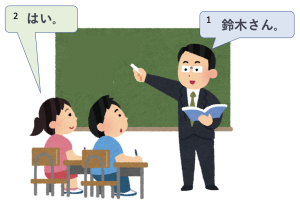Module 1.1 Dialogue
ROLL CALL
The teacher is conducting a roll call

| Language | Script and Translation |
Japanese |
*先生:鈴木さん。
*鈴木:はい。 *Click on the kanji with a dotted line to read its furigana |
Romanization |
Sensei:Suzuki san.
Suzuki:Hai. |
English translation |
Teacher: Ms. Suzuki.
Suzuki: Yes. |
Vocabulary
| Audio | Hiragana | Romanization | Kanji | English translation |
| せんせい | sensei | 先生 | teacher, professor | |
| すずき | Suzuki | 鈴木 | Suzuki (Japanese family name) | |
| 〜さん | ~san | Miss/Ms./Mrs./Mr. (so-and-so) | ||
| はい | hai | yes, here |
Grammar Notes
| 〜さん (〜san) |
〜さん (〜san), used after a person’s family name or given name, can be translated as Miss/Ms./Mr./Mrs.
It is used to address someone else in a polite or formal manner, not used in reference to oneself. For example, If you would like to address a person named Suzuki, you would call this person 鈴木さん (Suzuki san).
| 〜くん (〜kun) and 〜ちゃん ( 〜chan) |
〜くん (〜kun) and 〜ちゃん (〜chan), both used after a person’s family name or given name, is used to show familiarity or endearment towards someone.
・〜くん (〜kun) is generally used to address boys or men younger than the speaker. It can also be used for subordinates in the workplace. For example, けんくん (Ken kun).
・On the other hand, 〜ちゃん (〜chan), used after a person’s given name, can be used to address children. Female friends also use 〜ちゃん (〜chan) to call each other to show a close relationship. For example, はなちゃん (Hana chan). It can also be used to show affection towards pets.
せんせい
すずき
